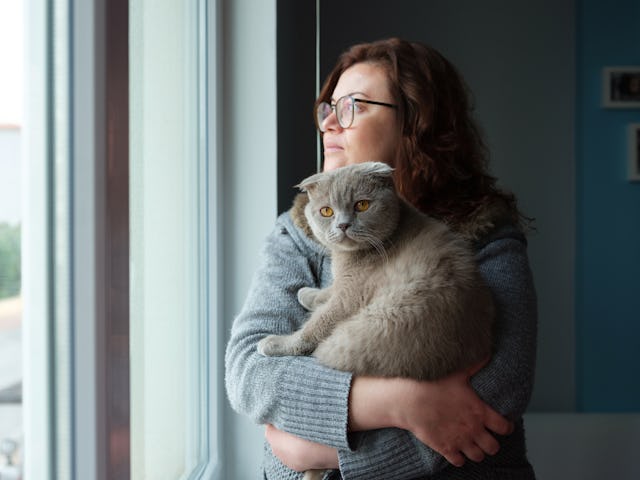Who Gets The Pets In A Divorce? Here’s Your Pet Custody Primer
From “pet-nups” to sharing time, lawyer Gabrielle Hartley unpacks the options.

For a lot of people, myself included, our pets are our family. I can't imagine living without my black cat, Olive — so much so that if I divorced my future spouse, I wouldn't hesitate to give him everything as long as I could have my cat (just don't tell him that). This is true for many pet parents, which is why it can be a literal dogfight deciding who gets pet custody when it comes to breakups and divorces.
In fact, a growing number of people are going to court to negotiate custody arrangements not for their children but for their pets. According to a 2014 survey from the American Academy of Matrimonial Lawyers, 27% of respondents had seen an increase in pet custody disputes in the previous five years. And realistically, that number has likely increased, given the uptick of pet adoptions from the COVID-19 pandemic... not to mention the “milestone divorces.”
Gabrielle Hartley, Esq., tells Scary Mommy that the door to pet custody cases has just opened recently, and as such, she's seeing a lot more cases than ever before.
"Until the past several years, pets were looked upon as furniture rather than sentient beings with specific needs," she says. "Today, in some areas of the country, the laws are starting to recognize pets as dependents rather than as pieces of furniture."
If you're in the middle of a breakup or divorce and wondering what will become of your precious fur baby in the process, read on for Hartley's advice.
Are pets considered property or dependents?
You might see your fur baby as your baby, but in the eyes of the law, they could be considered just as *important* as your blender.
"Historically, pets were considered property, like a couch," Hartley explains. This came as very bad news to many people who view their pets as true family members. Today, in some parts of the country, there's a growing trend to consider pets as family members, almost like children, considering their best interests. [However] as far as I know, as of yet, there are no pet guidelines for financial support."
When it comes to arranging custody for children (of the human variety), Hartley says that usually needs to be considered in the moment the custody is being decided "as their needs change over time. For pets, I'm unaware of any precedent around that. So, when it comes to pre-determining who gets to keep the pet, a contract before court may be a good idea."
For example, in some instances, couples draw "pet nups" before marriage. To avoid pet ownership disputes in the case of a divorce, these couples make agreements to decide what will happen with the pet and who will have custody of it to avoid any further legal disputes.
What should you address when it comes to pet custody before going to court?
When it comes to having sole custody of your cherished pet, you and your partner will ideally be able to decide — in an amicable manner — upon the best outcome whether you have a "pet nup" or not. In some cases, custody might be pretty clear. Maybe you adopted the cat before you met your partner. Or perhaps you are living in a new place that doesn't allow pets, which makes your partner the obvious choice to house your dog.
When there is talk of shared pet custody, Hartley says it may be a good idea to consult a pet behaviorist before making that decision.
"Someone with expertise around the adaptability of a particular breed can help you determine the best option for your pet," she says. "Some types of animals and breeds are more adaptable than others for a shared custody arrangement." Hartley notes that it's crucial to consider the breed, age, living situation, behavior history, and how your pet manages transition when deciding whether shared custody is a viable and happier option for your pet.
"Maybe most significantly, consider the dynamic between you and your ex," she says. "If you are volatile, your dog may be less likely to cope with shared parenting in the long run. Dogs, cats, horses, etc., all have different considerations."
So, what happens to the pet in a divorce?
Like in every divorce, what happens to your pet depends on the situation. "Sometimes people just agree before they even get to the courtroom or come to the mediation office," Hartley explains. "Sometimes the pet is used as a bargaining chip through the process. Every situation is different."
If you're facing a pet custody dispute, Hartley recommends (as she does with all disputes) taking a step back before moving forward. "Consider your pet's best interests in the totality of the circumstances," she says. You might love your pet, but wanting the best for them — even if it means not living with you anymore — is the biggest action of true love."
However, because pet custody is an emerging area of law that the courts are currently grappling with, there are still myriad unknown factors and things they cannot enforce. Case in point? Shared custody. Don't be discouraged, though. As Hartley reassures, "Who knows what will be possible in the future?"